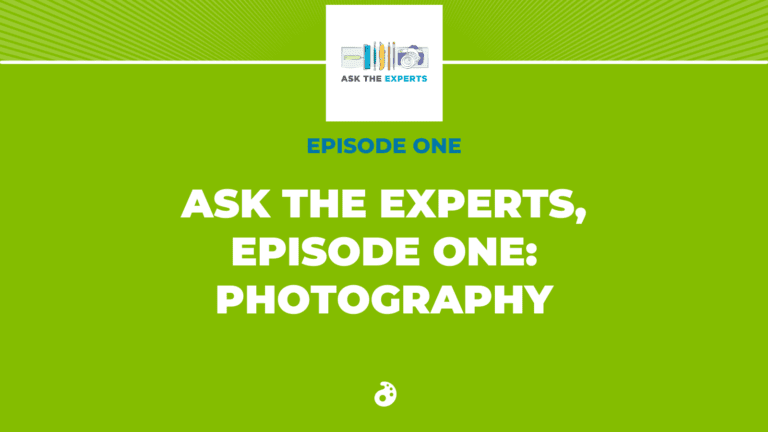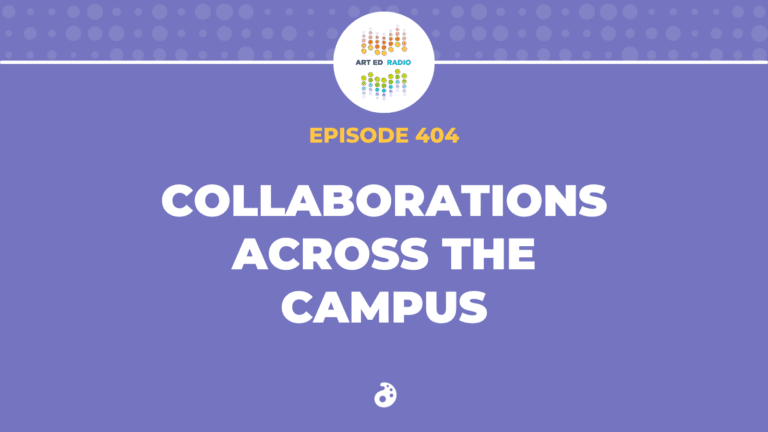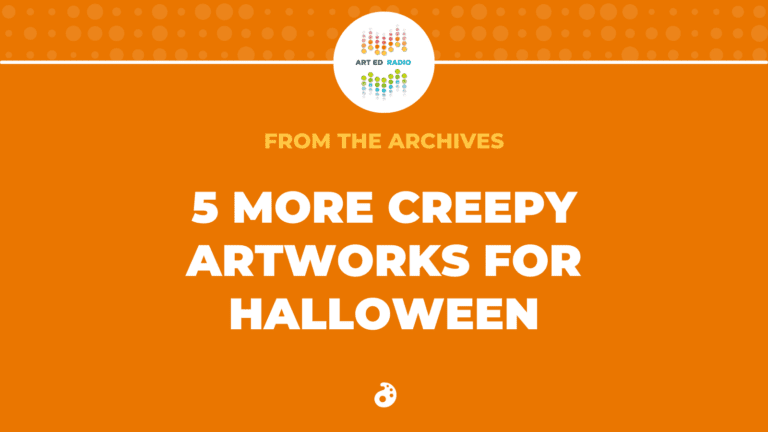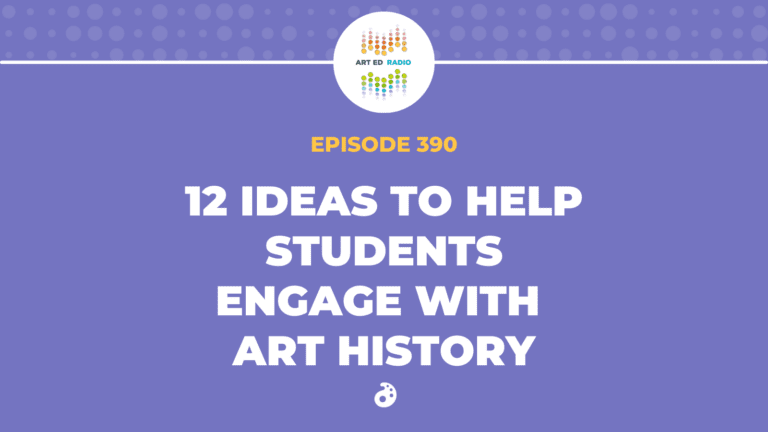In previous weeks Nic has been discussing healing, community, and connections. This week, she continues that conversation with two equity specialists from her school district, Yuko Larson and Troy Johnson. Listen as they discuss the importance of their role, how art can start a dialogue, and how communities can come together. Full Episode Transcript Below.
Resources and Links
- How to Help Students Reflect, Process, and Enact Change
- Inclusivity for All Learners in the Art Room
- A Perspective from Minnesota
- Follow Yuko on Twitter
- Follow Troy on Instagram
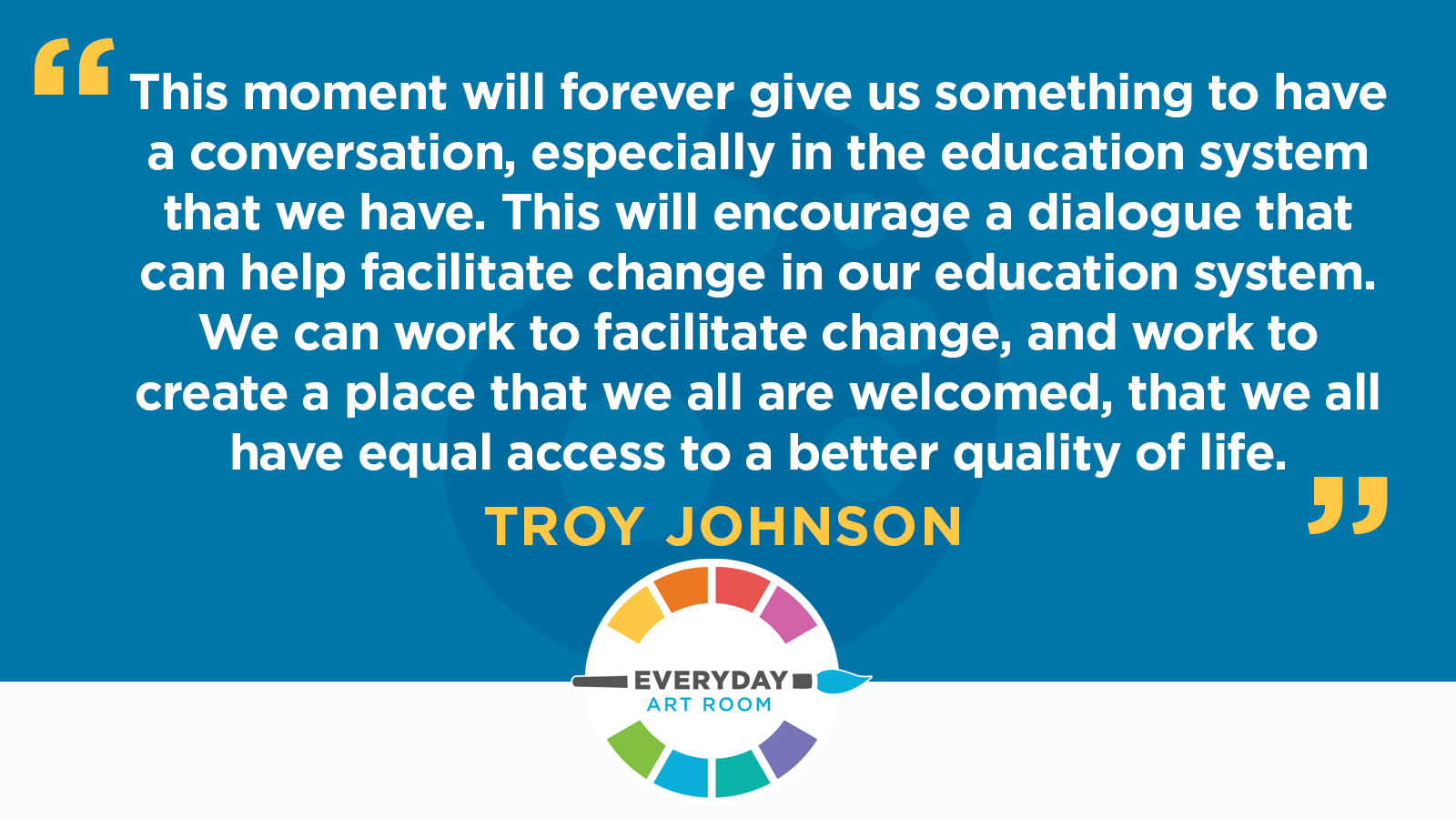
Transcript
Nic:
Today, we’re going to talk to two coworkers of mine. My district’s fairly large as far as Minnesota goes. We aren’t talking as big as some of those in Texas, but pretty big as far as Minnesota goes, and we have this amazing position that has been filled by phenomenal people.
I brought two of these people on today. Troy Johnson and Yuko Larson are equity specialists for ISD 728. And they’re going to talk about what their role is for our district and why it’s important, what they do for our students. This is Everyday Art Room and I’m your host, Nic Hahn.
Again, thank you so much for joining us today. Let’s get started with just some introductions. We have two speakers today. So, Yuko, would you like to introduce yourself first?
Yuko: Yes. Hi, my name is Yuko Larson. I am an equity specialist in the Elk River School District in Minnesota, and I have five elementary schools I work. I moved to the United States from Japan in 2002. I grew up in Japan and my families are still there. I go back every two years to visit them. When I came to the United States, my English was still not that good, so I took ESL class along with people from all over the world.
Nic: Great. And Troy, can you introduce yourself?
Troy: Okay. I’m Troy Johnson. I am one of the equity specialists in the Elk River School District. I work with the middle school and high school students in the Elk River School District. A little bit of background. I am originally from Texas, moved to Minnesota some years ago to attend college in Minnesota here, where I obtained a social work degree from St. Cloud State. And then later on, I obtained a master’s degree in social work from the University of Minnesota. So, I work with the young people. I like working with young people.
Nic: Yes. Excellent. Okay. All three of us work for the same district. As far as Minnesota districts go, ISD 728 is pretty big. And as you guys both mentioned, you’re working at several different schools. Now, you work as the role of equity specialist or cultural liaison. Yuko, can you talk about what that is?
Yuko: The title was cultural liaison before, but we changed our title two equity specialist about five years ago. And we decided that we are not just supporting the kids from different countries, but we are supporting kids who have all kinds of different culture backgrounds, including language, skin color, and poverty, all kinds of different ones. That’s why we changed the title to equity specialist.
Nic: That makes sense. You’re mostly in the elementary school, Yuko, but Troy, you work at the middle and high school. Can you tell me how that looks the same and how it’s different?
Troy: It’s the same, but also it’s a little different because we’re working with the young people who are a little bit older. And also we tend to work with the students in building relationships with the community and with the young people. And also for the young people to navigate the educational system, to make sure that they are somewhat getting what they need from the education system to be successful beyond high school and throughout high school.
We tend to do a lot more at the high school level. We do a lot more actually having the difficult conversations in the classroom with the young people. They’re a little bit more vocal. They want to talk more. They have concerns that they want to talk more about. The middle of high school is a little bit more of a challenge because the young people, they talk more, they are a little bit more independent, that kind of thing.
Nic: Yeah. Yuko, I know that you are invited into classes on a regular basis. What are some of the lessons that you have taught when you’re invited in?
Yuko: It is very important for elementary school-aged kids to learn the differences and similarities. So, I go into classrooms and I teach different cultures and also a kindergarten-aged kids, I talk about different language, skin color, food, the art, different kinds of instruments, where all the different instruments came from and what kind of materials they use.
And I also teach Mexico, Australia, Japan. Actually the Elk River School District was teaching about Japan before I came to Minnesota. So, it’s really cool how they teach it and they are awesome teaching it. So I’m very lucky to be able to teach my own culture, too. And a little bit older kids, I teach different cultures.
I also invite parents from different cultures, too. Parents will come to their kid’s classroom and talk about their own culture. It’s a great time to be able to learn different cultures from the native. And also, it is a great time for parents to come into their kid’s classroom and also the school too. Because sometimes, for parents from other cultures, it’s kind of intimidating to go to the American school system. They never went through the system, and also maybe the language is different. So it is intimidating.
It’s a good time for the administrator and the teacher and kids. And so, it’s a really good experience for everybody. And I also go to the classrooms in February for I Love To Read month, and I read books in Japanese, too. And I think kids really like that, too.
Nic: They love it. We all do. You do a great job and I get a front row seat to that. I get to see you bringing in some of the guests to the classrooms. So, that’s been a lot of fun. And we’ve had a great relationship for many years with that.
Troy, you talked about some of the more difficult conversations you’re having with students in the classroom. How are you invited? What are some of the conversations that you’re having with your class?
Troy: Some of the classrooms, they are reading novels. Like for an example, one of the middle schools, over the last 10 years, I have spoke to all the eighth graders that have came through the system. They are reading a novel every year and it was one of the books is called Warriors Don’t Cry. And it’s an autobiography of one of the Little Rock Nine students talking about her experience during that timeframe, in that sense.
So, then, what they do is they have me come in and have a conversation with the young people before they start the book to just get them to think about some of the language that is used in the book, somewhat put them in a timeframe of during that time and how people have felt, just to get them thinking about the book before they start reading it in that sense.
So yeah, there’s been various conversations or different classrooms that I have been invited to, depending on the novel or the subject that they have followed. I know the social studies class, during the civil rights movement, they’ve had me come in. I’ve spoken quite a bit of all different topics to engage the young people and making it more relevant to them, to what’s going on and what they are seeing, what they are hearing and what they’re thinking about in that sense.
Nic: And as a parent of an eighth-grader, I know that you have created a safe space to really open up those conversations and feel safe to have the questions that maybe some of our students are wondering. So, I appreciate that in you as well, Troy.
Troy: Thanks.
Nic: Yeah. Okay, let’s talk about, as equity specialists, you guys have some other roles and tasks, and you create some other events. Yuko, do you want to hit on some of the events that you guys have worked towards in the last couple of years?
Troy: We host cultural potluck every fall for get together with everyone in a school. That’s not just the staff, but families. I love cooking food and eating food, and I am a strong believer that food and music and art are the things that can bring people together.
Also, last year we started a study group. It is offered for any staff in the school district, and we get together after work to learn about equity. And there were staff from different areas, and it was great to learn from each other’s perspective.
Nic: Yeah, absolutely. Troy, do you have anything to add to some of the other things that you guys do in your role?
Troy: We’ve done a variety of teacher trainings, just having a conversation with the teachers, with the admin. We’ve did presentations with the administrators across the district. We have done that numerous times. Currently, at the middle and high school level, we do some groups in the school. Anybody who attends any middle school or high school in Elk River are entitled to be part of these groups that we have. We usually meet twice a month and we meet with the young people, just to hear their concerns and talk about current issues, things that they are dealing with, things that they are seeing in the school and how can we make a change and make the school more of a welcoming environment in that sense. There’s a variety of things we have participated in. We do a lot of field trips. We do the Festival of Nations every year. We get a group of kids who are interested in going to experience the Festival of Nations and those kinds of things.
Nic: Yeah, you guys have really given some amazing opportunities. And I would say that this is not something that was developed overnight. You are continuously meeting, continuously growing and improving. Wouldn’t you say that?
Troy: Mm-hmm (affirmative).
Yuko: Yes.
Nic: Yuko, we are talking mainly to our educators right now. What are some of the call to actions? The activities that art teachers can do to support what you do for our district?
Yuko: Well, I know Nichole does a lot of fun activities with students, and I know you always connect with the other culture teachers and exchange art or get idea from different countries and make those art. And I think that is a great thing for kids to do. Growing up in Japan, I never seen those art that you have on the wall in American school. So, it is always fascinating for me to look those art that kids made in American school.
So, it is really good for kids to know that, “Okay, different cultures are making these kinds of art, and we can maybe copy that and make it.” And that’ll maybe stick with them for a long time that, “Okay, this is from Australia. This is from Japan.” And I think through art, definitely you can make differences. You can teach them the similarities and differences, what kind of things that people are doing in the different culture, I believe.
Nic: Well, and Yuko and I have been friends for a long time, and she’s facilitated some of my first exchanges. I would agree with you, Yuko. I think of that first exchange we did. The artwork from Japan was so very different than what we sent over. And we learned so much from that experience. And I hope the students of Japan did as well.
Yuko: I’m sure they did. Yeah. It was really fun.
Nic: Yeah. Troy, do you have anything to add to that, as far as art specialists, what you would recommend? Let’s just go with that. Is there anything you’d like to add there?
Troy: I know every year at the high school, I’m on the committee of The Evening of the Arts for the high school. The art teachers get together and the young people display their art and that kind of thing. There is a cultural component that is added to that. And I usually will solicit the students who have different cultural backgrounds in to bring some of their art from their country and their culture, in that sense.
And they have display tables of their, from clothing to different artifacts that is from their culture, those kind of things. So every year, they even got the art from students at the high school, I am the person that usually somewhat organized students from different backgrounds and try to get them to display their art from their culture. I have them go home to ask their parents to bring some artifacts or dress in their traditional clothing and those kinds of things. And it’s a really unique way, and a really unique component to the Evening of the Arts for students.
Nic: Yes. I would agree on that. I’ve gone to, I think, almost every Evening of the Arts, and that is a powerful aspect of that night. In addition, we talked about the cultural potluck that you guys do and put on. And I know that you’ve brought in dancers and you’ve brought in many different aspects and musicians from the arts. You guys have really concentrated on that and made it a highlight for those big events.
Recently, I know, Troy and Yuko both mentioned to me that, since we are in Minnesota, it was important to stay very relevant. And since we have, sadly, the Memorial for George Floyd in our state, I know that you made a trip down there. Would either of you guys like to talk a little bit more about the relevance of that and why you felt it was important to do so?
Yuko: Well, I’ll go first. I think people had a different opinion about it, but I think this is a Minnesota history. This happened in Minnesota, is a really special place, I believe. People are nice and I think if we can work it together and make it work, then we can be a great role model for other states. And we can do that in Minnesota, I believe. And it was great that Troy took us to George Floyd Memorial. It was really powerful to see what African American people go through, for my work. And also as a human, I think it was really good for me to see.
Nic: Yes. Yeah. Thank you, Yuko. Troy, would you like to speak to that?
Troy: I asked our team at our last meeting. As a team, we had our last meeting and I encouraged, and I asked my coworkers if they would be interested in going down to the George Floyd Memorial. I had went before, but it’s a memorial that you can’t explain or tell someone how it is. You almost have to go there and experience it.
It was a good opportunity for people just to get a feel of the community, of what’s going on, the grieving process of what’s going on. And then, how do we have that difficult conversation about how do we change our outlook? I had this conversation every day in my barber shop about what’s going on. Around the world, the eyes are on Minnesota right now, what’s going on. Everybody’s watching Minnesota and hoping that things will change. Minnesota has the opportunity to be an agent of change for the whole country and around the world, in that sense.
It was a really good opportunity for us as a team to go and to have a dialogue, and to experience the memorial. The media, it’s not portraying it in a way that I think, if you went there for yourself to see, and as Yuko mentioned, you have to go there. I know a lot of people say, “Oh, is it safe? Will anything happen to me while I’m there?” That was the least of my concern when we were there. That was the least of our concern. We walked around, we took pictures. It was just people walking around and taking it in. It is a different feel when you are there in that area of the place.
So, I think this will forever give us something to have a conversation, especially in the education system that we have. This will hopefully encourage a dialogue that we all can somewhat partake in and do our part to help facilitate change in our education system. Because every aspect of our life, we will have to have this conversation, and hopefully facilitate change, and hopefully that we can create a place that we all are welcomed, that we all have equal access to a better quality of life.
And that’s what it’s really coming down to is the quality of life for all people. And around the world, the United States, Minnesota, the Elk River School District, we just want an equal quality of life for everyone, regardless of your cultural background or your color of your skin or the language you speak, those kinds of things. So, yeah, it was a good experience for me to see my coworkers, they went with me to stand alongside me as an African American, that I have to live with this. This is part of what I have to deal with on a day to day basis at the same time.
Yuko: Yeah, and what was great was, he’s great that he answered every question that we have and he always say that there’s no wrong questions, so we can ask anything. Even we think maybe it will offend him, or maybe it’s not his opinion, but we can ask him and he will answer in a positive way. And I really appreciate that.
Nic: Yeah. And that’s the message I have heard from the people that know Troy. Troy is not a personal contact to me just because we don’t work in the same area, but my husband does, and he has worked with my children, and I hear that continuously. You’re very approachable and willing to answer any questions. And I feel the same about you, Yuko, as well, that you’re always willing to answer any question that we have. So, you guys really give a gift back to our district. And Troy, you mentioned, just in brief, that you are also a barber. You have a barbershop and just quickly, is there any overlap or things that you learned from that position that helped you in your life as an educator, as well?
Troy: As a barber, it does. It does. It’s connected. It’s all educational to me, the people that I come in contact with in the barbershop. We have a conversation. The people that come in there, I tell them that I work in a school, and they’re like, “Oh, wow, that’s kind of different. We’ve never had a barber that worked in a school at the same time.” And then I educate them on what my role is in the school district. And it was like, “Oh, that’s cool. That’s nice. We need that. We need that in the school. That’s a good opportunity.”
Then at the same time, I encourage them to participate in the educational process of their kids or their families or themselves who come to the barbershop, that the more education you have, the better informed you are. And then the better informed you are, the better trust is that you make in life. And in general, what you choose. Out in the community, wherever it may be and that kind of thing. So, it does. It’s connected to it.
And then, too, for the young people at the school, when I tell them I’m a barber and they’re like, “Oh man, that’s cool. I’ve never even thought of being a barber.” Or, “What does a barber do?” Those kind of things. So, it’s both ways. Even when I’m in school, they always ask, “Are you a barber?” Some days I’ll bring my Clippers and show them, or I have pictures of haircuts and things that I’ve done over the years. And the kids are like, “Oh man, I never thought about it.” It’s a really good conversation starter for young people.
I’ve did career fairs at Rogers High School, Elk River High School, where I came in as a barber. And they had me talk to them about what it is to be a barber. What are the benefits? It is a career. It’s a profession just like teaching or in the education field. It’s no different in that sense. It’s a really unique way to have conversations with people. The barbershop is a place that people want to talk and we talk about issues that are going on in society, in the community, those kinds of things. So, I really enjoy talking to people in that sense. I’m a people person.
Nic: Yeah. Yes.
Yuko: Definitely.
Nic: Really, thank you both so much for joining us today. I think your message is one to hear beyond art education, just in education in general, how you guys have built an open space in our district. So, thank you so much for being with us today.
Yuko: Well thank you for having us.
Troy: Yeah. Thank you for having us.
Nic: As always, I’m grateful to our guests. Everybody that I interview, everybody that I talk to, has something more to give to our listeners. And I hope today, as you were listening to Troy and Yuko, you were able to hear some important messages about equity especially. What that means, why it’s important and just understanding that this has been a developing thing over years for our district, but it’s something that we continue to grow and continue to improve on. And we have phenomenal employees in these roles. Our students are extremely lucky. They don’t know how lucky they are. Our staff does know. We appreciate the message that our equity specialists bring to our students and our staff.
And furthermore, we are grateful today as Everyday Art Room listeners, to understand what kind of roles and what kind of actions we can do to make change in our current state of Minnesota, and our current state of the United States and throughout the world. So again, thank you to Troy, thank you to Yuko.
If you are looking for more information on topics of equality, please listen to Art Ed Radio. The last couple of weeks have been focused on this idea, this conversation. I think that it’s important to educate ourselves as much as possible, so we can be the best visual art teachers that we can possibly be. Thanks for listening today.
Magazine articles and podcasts are opinions of professional education contributors and do not necessarily represent the position of the Art of Education University (AOEU) or its academic offerings. Contributors use terms in the way they are most often talked about in the scope of their educational experiences.
